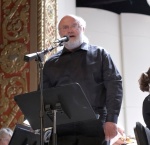AT THE LIVING CRECHE
A camel in the church yard on State
walked around the fence toward our car
(This is true! It really did happen
late Christmas Eve after I picked up
Faith and Christine from Mass) and he bent
down to stick his head in the window.
Snow collected on his pelt. The steam
and stench of camel breath filled the air.
 Q: Do you remember where you were and what you were doing on the day you wrote the above poem?
Q: Do you remember where you were and what you were doing on the day you wrote the above poem?
A: The events recounted in “At the Living Creche” were—as the poem shouts—real. That camel really did stick his head in the car after Christmas Eve Mass, right here in Ann Arbor, Michigan. The snow was really falling. And we really did smell some foul camel breath in the car.
Although I didn’t take notes on it at the time (the way I did for most of the little poems informed by science or by observation of the natural world that are included in Marginalia for a Natural History), I certainly remembered the moment. I mean, it is just one of those wildly absurd moments where the things of the lived world seem beyond the powers of invention—comic and more than a little tragic (a camel in a Midwestern American snow storm?) all at the same time.
Months later, in July, when I was off at my wonderful summer job teaching at the University of Michigan Biological Station in northern Michigan, I was sitting at a picnic table behind the little cabin they give me, looking out over Douglas Lake, and trying to bring some of these eight line poems together. And I remembered that poor camel. It fell quite easily into the eight line form, went through three or four quick revisions, and I included it with some poems I sent to the journal Hanging Loose. It seems as if they accepted the poem almost immediately. When I began to imagine all of these as a unit, it fit in very neatly.
Q: What is the last book you’ve read that made you want to grab a pen and write?
A: I know exactly which book it is because I’ve just finished reading it (March 19, 2010)! But, sadly, it’s not a book of poems. It’s a wonderful new novel called Next, by James Hynes. It’s a great story about a middle aged man trying to get some sense of himself. It all takes place in one day, and it has a wildly unpredictable ending that once you get to it seems absolutely inevitable. I won’t tell you the ending. But Hynes moves in and out of his various stories so smoothly that the reader never knows he’s being led around. It is masterful. When I realized the novelist was doing this to me, my first reaction was to wonder if I could do anything like that quite as easily. I’m still going to keep trying.
Although I’ve read a bunch of poetry books recently that have moved me and that I’ve admired, probably none made me want to write as much as Merwin’s much praised The Shadow of Sirium. I know a few thousand other people feel the same way about the book, and I wish I could be more original. But it has clarity of language and a precision of perception that sets a standard for poets who write about the physical world.
Q: What is the most sublime meal you’ve ever eaten?
A: When I was young and penniless I spent a few years wondering through France. For much of one year, I washed dishes (paid illegally, of course) in a very fancy country restaurant south of Toulouse. I ate foods there every day that I had never heard of—oysters, steak tartare, artichokes, and on and on. I remember them all fondly. And I learned to eat like a Frenchman, even if only a poor Frenchman. When my best friend came to visit me, we hitchhiked down to the walled medieval city of Carcasonne. I remember sitting outside the back walls of Carcasonne, drinking very cheap wine, tearing off pieces of bread, cutting sausage and camembert cheese, ending with an apple and chocolate. Simple. But my friend died young, and I remember almost every aspect of that meal.
Keith Taylor is the author of Marginalia for a Natural History, forthcoming from Black Lawrence Press in 2011.
